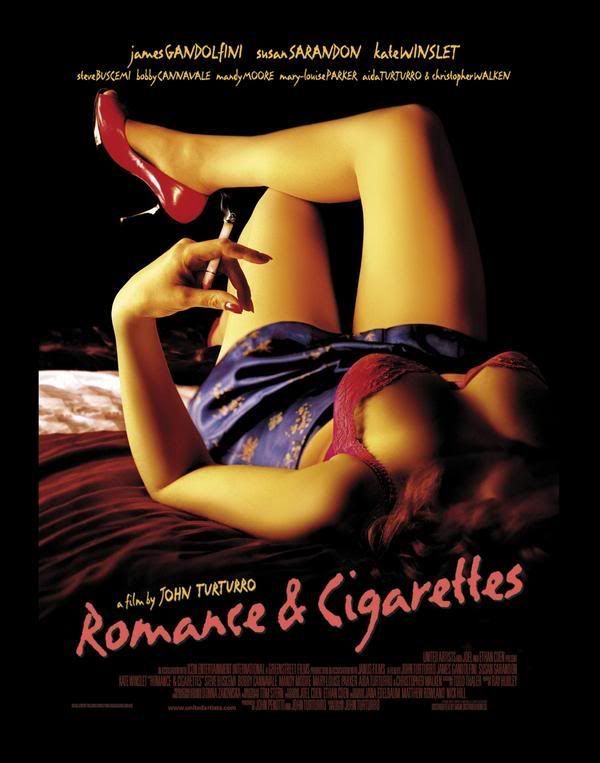
Romance and Cigarettes (2005 - 2007)
by
Sara Freeman
Romance and Cigarettes, an anti-musical-musical and an anti-romance-romance, is a film that sets fire to all of its nearby genre walls just so it can have the privilege of pissing on the ashes. It’s crude, it’s lewd, and it’s a jazzed-up song and dance fest that turns a significant number of sensibilities on their head. They don’t make films like Romance and Cigarettes every day.
The plot, though bordering on slim and nil, is about a construction worker named Nick Murder (James Gandolfini), who is cheating on his wedding dress designer wife, Kitty (Susan Sarandon), with “one crude broad” and lingerie sales girl, Tula (Kate Winslet). Throw in a bout of lung cancer, three adult daughters (Mary-Louise Parker, Mandy Moore, Aida Turturro), and a poem about the lusciousness of the female orifice and you’ve got the plot of Romance and Cigarettes in one wacky nutshell.
I’m not a fan of the term or idea of camp or campiness, but I’ll use it here because it’s the easiest way to give you an impression of Romance and Cigarettes. I’d say the camp factor falls somewhere in-between the worlds of John Waters and Douglas Sirk, which is mostly caused by the incredibly strange and wonderful staging of the many musical numbers. Some of the people who dance can’t actually dance and most of the people who sing can’t really sing, which I would say falls under the umbrella of John Waters’ auteurism and puts a great deal of people off because they‘re used to the bravado of musical film productions like Chicago (2002) or Moulin Rouge (2001). But the film works as a both a whole and as a better movie than both Chicago and Moulin Rouge because of the Douglas Sirk aspect - that strong, ultimate power of anti-emotion or over-emotion and artifice. However, instead of being artificial, Romance and Cigarettes is as gritty and potent as possible in terms of emotional content. Those aspects are sort of a counter-point to the clear artifice of the musical numbers.
John Turturro, the film’s director, purposefully plays the film like it’s amateur hour (poorly composed shots, out of sync music, bad acting) for the majority of the film to add to that artifice. He also takes elements of golden era musicals - pastel colors, choreographed dance sequences, and spontaneous bursts of song - and applies them to the crass underbelly of Brooklyn, NY. These musical moments are staged with folks as diverse as construction workers, nuns, heavily pregnant women, and occasionally Christopher Walken impersonating Elvis Presley. Diversity is even more prominent with the tunes played in the background to guide the characters - they sing and dance to Tom Jones, Janis Joplin, Engelbert Humperdinck and occasionally a bit of Irving Berlin. Odd as it seems, all of these seemingly wacky puzzle pieces fit together and create one of the weirdest and one of the best musicals in the history of the genre.

There’s nothing conventionally beautiful about the people in Romance and Cigarettes and yet they’re all beautiful people. The songs they sing lift them out and beyond their circumstances and into the realm of influential, poignant cinema. Foul language never sounded so poetic. I don’t think I’ve ever seen anything quite like it before. Having seen the film twice now (once in theatres and once on a R2 DVD), I can safely say that my love for this cinematic oddity wasn’t a lark the first time around. Few moments in movies this year make me smile and laugh as I did during the first musical number “A Man Without Love” and few have the impact to make me cry as I have the two times I’ve seen it like the ending of this film.
A sincere and profound joy exists within Romance and Cigarettes. It is also brash, crass, and hysterically disobedient in terms of content, narrative, and the traditional fare of the lead actors. The story itself may not revolutionize your way of thinking, but the melodic aesthetic may make you reevaluate the way you think about the musical genre itself. I can’t recommend the film highly enough.







No comments:
Post a Comment